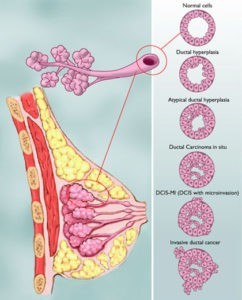Of the 1,292 patients (breast cancer) in both cities who said they received radiation therapy, just over 20 percent were not coded that way in the SEER database.
My mom was diagnosed with DCIS in 2003 when she was 74 year of age. My mom didn’t know that ductal carcinoma in-situ was not cancer. Dr. Silverman told my mom that she had breast cancer that was early stage and that she should undergo a lumpectomy, local radation and five years of tamoxifen.

My mom likes Dr. Silverman very much so she followed Dr. Silverman’s recommendations to a tee. My mom developed chronic atrial fibrillation a few years ago. We’ll never know for sure of course but my experience as a cancer survivor and cancer coach has taught me that heart damage is a late stage side effect of breast cancer patients who undergo local radiation.
Accurate SEER data may have changed Dr. Silverman’s recommendations.
So as you can see the article linked below points to the far reaching effects caused by the problems with breast cancer research.
My long-term cancer experience has taught me that cancer patients must practice both conventional (FDA approved) and evidence-based non-conventional cancer therapies. Please watch the free webinar linked on the right of this page.
Thank you,
David Emerson
- Cancer Survivor
- Cancer Coach
- Director PeopleBeatingCancer
Recommended Reading:
Why Cancer Patients Can’t Trust Conventional Cancer Research
Chemotherapy and Over-treatment in Breast Cancer
Breast Cancer-Prevent Radiation-Induced Dermatitis- Ugly, Painful Side Effect
“Twenty percent of breast cancer patients who receive radiation after they undergo breast-conserving surgery may not have their radiation treatments recorded in a federal database known as the Surveillance Epidemiology and End Results (SEER) registry, according to a new study. This could spell trouble for researchers who hope to examine patterns of cancer treatment from the data.
In the study, a University of Michigan Comprehensive Cancer Center team compared SEER data with treatment reports from breast cancer patients in Detroit and Los Angeles. Of the 1,292 patients in both cities who said they received radiation therapy, just over 20 percent were not coded that way in the SEER database.
Researchers found that radiation treatment wasn’t correctly coded in the SEER database for 11 percent of people living in Detroit and for one-third of patients in L.A. Eeesh!
Why it matters: Previous studies based on this skewed SEER data have led researchers to conclude that women aren’t receiving radiation after breast-conserving surgery, and in turn, the medical community has stepped up the push for radiation treatment in general. But gah! Obviously, research based on inconsistent, false data could result in misleading conclusions.
Although there’s not much a breast cancer patient herself can do about these wacky data errors, it boils down to being informed and assertive as a patient. You can’t necessarily trust that official patterns and research will reflect/inform your personal experience.




